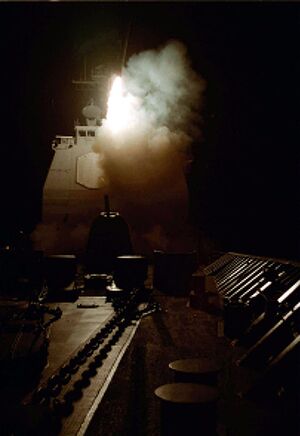Difference between revisions of "1998 bombing of Iraq"
(start) |
(change perpetrator to "Bill Clinton/Presidency") |
||
| (One intermediate revision by one other user not shown) | |||
| Line 4: | Line 4: | ||
|end=19 December 1998 | |end=19 December 1998 | ||
|constitutes=War | |constitutes=War | ||
| − | |perpetrators=Bill Clinton | + | |perpetrators=Bill Clinton/Presidency |
|locations= | |locations= | ||
| − | |wikipedia= | + | |wikipedia=https://en.wikipedia.org/wiki/1998_bombing_of_Iraq |
|fatalities= | |fatalities= | ||
|injuries= | |injuries= | ||
Latest revision as of 07:20, 30 September 2022
 | |
| Date | 16 December 1998 - 19 December 1998 |
|---|---|
| Perpetrators | Bill Clinton/Presidency |
The 1998 bombing of Iraq (code-named Operation Desert Fox) was a major four-day bombing campaign on Iraqi targets by the United States and the United Kingdom.
History
On December 16 1998, President of the United States Bill Clinton announced that he had ordered strikes against Iraq. The contemporaneous justification for the strikes was Iraq's failure to comply with United Nations Security Council resolutions and its interference with United Nations Special Commission inspectors who were looking for weapons of mass destruction, The inspectors were sent back in 1997 and were repeatedly refused access to certain sites thus compelling the U.S to launch strikes.
Clinton's decision was criticized and challenged by many Key members of the congress, Accusing Clinton to direct attention from ongoing impeachment proceedings, against him.